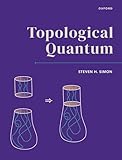Topological quantum
Material type: TextPublisher: New York : Oxford University Press, [c2023]Description: 611 pISBN: 9780198886723LOC classification: QC23.2.S56
TextPublisher: New York : Oxford University Press, [c2023]Description: 611 pISBN: 9780198886723LOC classification: QC23.2.S56| Item type | Current library | Collection | Shelving location | Call number | Status | Date due | Barcode | Item holds |
|---|---|---|---|---|---|---|---|---|
 Book
Book
|
ICTS | Physics | Rack No 9 | QC23.2.S56 (Browse shelf (Opens below)) | Checked out to Saptarshi Mandal (0001657139) | 12/13/2024 | 02830 |
1.:Introduction and Ancient History
2.:Kauffman Bracket Invariant and Relation to Physics
I Anyons and Topological Quantum Field Theories
3.:Particle Quantum Statistics
4.:Aharonov-Bohm Effect and Charge-Flux Composites
5.:Chern-Simons Theory Basics
6.:Short Digression on Quantum Gravity
7.:Defining Topological Quantum Field Theory
II Anyon Basics
8.:Fusion and Structure of Hilbert Space
9.:Change of Basis and F-Matrices
10.:Exchanging Identical Particles
11.:Computing with Anyons
III Anyon Diagrammatics
12.:Planar Diagrams
13.:Braiding Diagrams
14.:Seeking Isotopy
15.:Twists
16.:Nice Theories with Planar or Three-Dimensional Isotopy
17.:Further Structure
IV Some Examples: Planar Diagrams and Anyon Theories
18.:Some Simple Examples
19.:Anyons From Discrete Groups Elements
20.:Bosons and Fermions from Group Representati
21.:Quantum Groups (In Brief)
22.:Temperly-Lieb Algebra and Jones-Kauffman Anyons
V Applications of TQFT Diagrammatics
23.:State Sum TQFTs
24.:Formal Construction of “Chern-Simons” TQFT: Surgery and More Complicated Manifolds
25.:Anyon Condensation
VI Toric Code Basics
26.:Introducing Quantum Error Correction
27.:Introducing the Toric Code
28.:The Toric Code as a Phase of Matter and a TQFT
29.:Robustness of Topologically-Ordered Matter
30.:Abstracting the Toric Code: Introduction to Tube Algebra
VII More General Loop-Gas and String-Net Models
31.:Kitaev Quantum Double Model
32.:Doubled-Semion Model
33.:Levin-Wen String-Net
VIII Entanglement and Symmetries
34.:Topological Entanglement
35.:SPT Phases of Matter
36.:Anyon Permuting Symmetry
IX Further Thoughts
37.:37 Experiments (In Brief)
38.:Final Comments
39.:Appendix: Kac and Other Resources for TQFTs
40.:Appendix: Some Mathematical Basics
At the intersection of physics, mathematics, and computer science, an exciting new field of study has formed, known as “Topological Quantum.” This research field examines the deep connections between the theory of knots, special types of subatomic particles known as anyons, certain phases of matter, and quantum computation. This book elucidates this nexus, drawing in topics ranging from quantum gravity to topology to experimental condensed matter physics. Topological quantum has increasingly been a focus point in the fields of condensed matter physics and quantum information over the last few decades, and the forefront of research now builds on the basic ideas presented in this book. The material is presented in a down-to-earth and entertaining way that is far less abstract than most of what is in the literature. While introducing the crucial concepts and placing them in context, the subject is presented without resort to the highly mathematical category theory that underlies the field.
Requiring only an elementary background in quantum mechanics, this book is appropriate for all readers, from advanced undergraduates to the professional practitioner. This book will be of interest to mathematicians and computer scientists as well as physicists working on a wide range of topics. Those interested in working in these field will find this book to be an invaluable introduction as well as a crucial reference.--- summary provided by the publisher


There are no comments on this title.